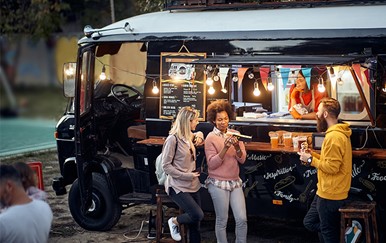The popularity of street food has been increasing in the UK, with food truck businesses popping up at food and music festivals, outdoor markets, and even private events.
The diversity in the cuisines available as part of the street food industry means there’s also more potential to capture a lucrative corner of the market by starting your own (delicious) food truck business.
But is a passion for creating gourmet delights enough and are there any pitfalls in turning your culinary creativity into a fully-fledged business? We’ll explore all the avenues you should consider before embarking on your journey to starting your very own food truck business.

What to consider before launching
Being as knowledgeable and prepared as possible before starting any business is always going to pay dividends and make the launch as smooth as possible.
It goes without saying that previous experience in a commercial kitchen or catering business is advisable before trying to make a success of a food truck business yourself.
Pitching and permits
Unfortunately, you can’t just park up your food truck wherever you want and start selling, it’s a bit more complicated than that. You will need to apply for a street trading licence and will need permission from your local authority and/ or the landowner of where you plan on parking your truck.
It’s possible that you may well need to rent a commercial pitch at your local market or town centre. However, commercial pitches for food trucks may be in high demand in your desired location so it’s worth researching what’s available before investing in your business. It’s possible there may even be a waiting list for a regular pitch.
We’ve created useful guides to catering pitches to help you on your journey to being a food truck business owner.

Licences
Regardless of whether you’re planning on having a regular pitch in the same space or creating a mobile catering business, you will still need the appropriate licences in place to be able to prepare and sell food to the public.
The UK government’s licence finder tool can be helpful in suggesting which licence(s) you may need for your business.
The rules, regulations and commercial pitches and permits available for vending food vary depending on the location and local authority of where you plan on setting up your business.
You can apply for your street trading licence directly via the government website.
What is the competition like?
Whilst a popular food truck business has the potential of being a lucrative enterprise, by default this usually means there’s going to be some healthy competition out there too.
In the location(s) you’re looking to sell from, is there space in the market for the food you plan on serving? Launching a pizza truck alongside some already well-established food trucks serving the same food may not make the most business sense.

What are the most popular types of food served?
Deciding on what type of food you’ll serve from your truck is as much about making a smart business decision as it is about your passion and culinary creativity.
Some of the most popular food types served from food trucks and vans include:
- Burgers
- Pizzas
- Loaded Fries
- Mac and Cheese
- Indian street food
- Falafels
If you need more inspiration for the type of menu you should cook up for your food truck business, read our guide to the top 10 food truck ideas.
Is there an appetite for your menu?
Once you’ve decided on what style of food you’re going to serve, it’s a good idea to test the market to see if people like what you have to offer, before launching headfirst into buying a food truck and getting your business on the road.
Is the cuisine you’ll be serving, and the price point you’ll be selling it at, right for your local consumers? You could start small, by renting a pop-up stall on a market or having a marquee and table arrangement at a couple of food festivals before financially committing to a food truck.

Investing in stock and equipment
Buying a food truck is one thing but, whether you’re modifying an existing food truck, or fully kitting one out from scratch to serve the specific requirements you will have for preparing your menu in a small space, this can be one of the costliest parts of launching your business.
Remember, it’s not just about food preparation; hygienic storage of your ingredients, produce, and even your truck, are going to be important considerations to plan for too.
Getting paid
The great part about turning your passion into an income is getting paid for what you love to do.
Making sure you’ve got the appropriate methods for accepting payment from your customers is a crucial part of the start-up process. It’s likely this will be an ongoing cost you’ll need to factor into your monthly overheads too.
If your business is solely going to run on cash, you’ll need to make sure you have a proper float set up (and that you don’t run out of change mid-service).
However, we’re moving towards an ever more cashless society (especially post-pandemic). Investing in a point of sale (POS) system will most likely incur an ongoing cost but not only will it ensure you can accept a lot more payments, but it’ll also probably make tracking how many dishes you serve a lot easier too.

Health and safety and hygiene training
By law, it is the responsibility of the ‘food business operator’ to ‘ensure that food handlers receive the appropriate supervision and training in food hygiene, which is in-line with the area they work in and will enable them to handle food in the safest way’.
As well as providing a hygienic food handling environment, it is also your responsibility to ensure that you have a healthy and safe working environment for yourself, and anyone else that will be working on your food truck.
Additional resources for setting up a safe, healthy and hygienic food business:
- Food Standards Agency – guidance for setting up a food business and guidance for food hygiene for your business.
- Health and Safety Executive – guidance for health and safety in the catering and hospitality industry.
- The Nationwide Caterers Association – resources for legal and compliance in the catering industry.
Protecting your business
As a food truck owner there are several insurances that you should consider, some of which will be obligatory and some of which can offer you important additional protection:
- Mobile catering van insurance – if your food truck is going to be on the road, then it’s a legal requirement to have it insured.
- Public liability insurance – this will protect you in the eventuality that a member of the public is injured, or their property is damaged because of your business.
- Employee liability insurance – this is a legal requirement if your business has any employees as it offers protection against employees becoming ill or injured as a result of working for you.
- Insurance for business equipment and inventory – if any of your equipment or stock is damaged or stolen, you will be covered.
If your food truck business is your sole source of income, there are other insurance policies you may wish to consider protecting your income in the event of you being ill or unable to trade.
How much will it cost to launch?
There’s certainly lots to consider before launching your food truck business and, despite it being a more affordable option than setting up a restaurant or large catering business, there are still costs that can soon begin to add up, especially if you don’t budget for them appropriately.
Once you’ve factored in the cost of the van, kitting it out, buying all the produce you need to getting cooking, the cost of licences and pitches, setting up a POS system, the fuel needed to get from A to B and all the insurances you’ll need as a responsible business owner, you’re looking at anything from a couple of thousand pounds to running into the tens of thousands of pounds to kick start your business.
For a more detailed breakdown of the start-up costs involved in launching your street food business, read our guide to how much it costs to start a food truck business.

The pros and cons
If you have a passion for serving up delicious dishes and are looking for a way to turn that passion into a full-time earner, then a food truck business can be a lower risk and lower cost option (certainly when compared to setting up your own restaurant).
However, there are pros and cons to every business venture and food trucks are no exception.
Pros
- the start-up costs are lower than opening a restaurant or starting a large catering business
- lower start-up costs mean lower risks associated with investing in your own business
- commercial pitches and/ or market stalls are lower cost and lower commitment than bricks and mortar businesses.
- You can turn your passion into a full-time income.
Cons
- You’ll be entering into a competitive market
- Even though the start-up costs are comparatively low, you’ll still need to source finances to get your business up and running
- you’ll likely need to start early, work long hours and be on your feet all-day
- you’re at the mercy of the British weather, cold and miserable days may hamper your trade
- you can’t just pitch up wherever you think the demand is, you need a proper pitch and/ or the appropriate licences to sell to the public.
Read our dedicated article for a deeper dive into the pros and cons of starting up a mobile catering business.
Related article

Pros and Cons of a Mobile Catering Business
Discover the pros and cons of starting and running a mobile catering business.
Read more









